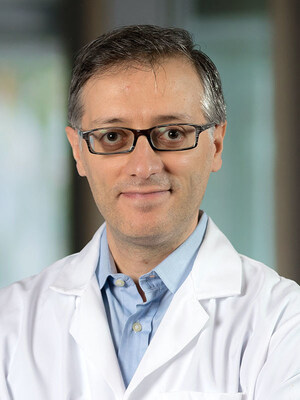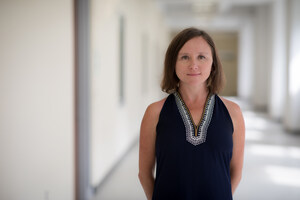Over $400 Million Raised to Date, Including Largest Gift in the College of Medicine's History
BRONX, N.Y., April 15, 2013 /PRNewswire-USNewswire/ -- Addressing an enthusiastic gathering of more than 400 supporters, alumni and faculty, Allen M. Spiegel, M.D., the Marilyn and Stanley M. Katz Dean of Albert Einstein College of Medicine of Yeshiva University, tonight publicly announced the College of Medicine's largest fundraising effort—a capital campaign to raise at least $500 million, known as "The Campaign to Transform Einstein."
(Photo: http://photos.prnewswire.com/prnh/20130415/DC95237-a)
(Photo: http://photos.prnewswire.com/prnh/20130415/DC95237-b)
(Logo: http://photos.prnewswire.com/prnh/20120531/DC16559LOGO)
On what was promoted as a "historic" evening at the Plaza Hotel in Manhattan, Dr. Spiegel revealed that a bequest of more than $160 million—the largest gift in the school's 60-year history—had recently been received from a leading Einstein supporter. The college has raised more than $400 million in this campaign, and is poised to meet or exceed its goal. The funds raised are allowing the research-intensive medical school to experience remarkable growth, spearheaded by the leadership of Dr. Spiegel, who arrived at Einstein in 2006 following a distinguished 30-year career at the National Institutes of Health (NIH).
Of particular note was the recent bequest by longtime supporter Muriel Block, who died in 2010, having generously provided for Einstein through her estate. The gift, given in the name of Mrs. Block and her late husband, real estate executive Harold Block, will significantly advance the College of Medicine's goal of improving human health, and in recognition the school will name several significant entities for the Blocks, including:
- The Harold and Muriel Block Institute for Brain Research;
- The Harold and Muriel Block Building, which will house administrative offices and additional research space;
- The Harold and Muriel Block Institute for Clinical and Translational Research at Einstein and Montefiore (the University Hospital for Einstein); and
- A series of 10 new, fully endowed chairs, known as the Harold and Muriel Block Scholars.
(Learn more about how the gift from Harold and Muriel Block will be used and honored at Einstein.)
"I am grateful for the visionary leadership and support of Einstein's Board of Overseers, and for the remarkable generosity of Muriel Block and our other donors," said Dr. Spiegel. "They can all take pride in Einstein as a medical school that will excel in achieving its educational and research mission."
In addition to doubling the rate of fundraising during Dr. Spiegel's tenure, Einstein was awarded $160 million in NIH funding for 2012, a 61 percent increase over 2000–2003, when the NIH budget was doubling and the success rate for applications was twice what it is now. The 2012 funding allocation occurred at a time when the NIH budget was flat and securing grants incredibly difficult. Since 2006, the College of Medicine has added more than 140 faculty members, including key chairs and senior-level recruits from leading institutions. Einstein has also established institutes and centers in fields of national importance, including cardiovascular disease; cancer prevention and control; stem cell research and regenerative medicine; and clinical and translational research.
The wide-ranging efforts have resulted in key advances affecting human health. These include: the discovery of a lifesaving two-drug combination for extensively drug-resistant tuberculosis; the finding that breast cancer spreads only when a specific trio of cell types exists within a single tumor, which could help tailor treatment for each patient; development of drugs in clinical trials for treatment of lymphoma and gout; and the discovery of a process that causes cells to improperly dispose of their waste, a dysfunction contributing to a range of diseases, including Parkinson's and Huntington's, and offering a target for new treatments. Read more Key Accomplishments.
During the remainder of this campaign, continued philanthropic support will allow Einstein to expand its focus on health areas of national priority and continue to recruit pioneering faculty members to lead groundbreaking research and education projects. Several innovative initiatives are in the process of being launched, including:
- A Center for Experimental Therapeutics, designed to accelerate the movement of potential drugs through the development pipeline and into the marketplace;
- A Genome Sequencing and Analysis Initiative, to answer genetic questions on a wide range of diseases and leverage the resources of the newly established New York Genome Center, of which Einstein is a founding member; and
- A state-of-the-art Education Center that will encourage interactive, small-group learning, employ the latest technology and feature more dedicated study space. It will also house a new simulation center to help students hone the development of anatomical skills.
"As you can see from these results, Dean Spiegel's ambitions and vision for Einstein have the enthusiastic support of thousands of donors, and the biomedical research and education taking place are remarkable," said Dr. Ruth L. Gottesman, chair of Einstein's Board of Overseers. "I have never been more enthusiastic about our future. This is a very special time to be involved with Einstein."
Dr. Gottesman has been a tireless advocate for Einstein's research efforts and the interests of its students, and has chaired Einstein's Board for the past six years. She has helped support the school's key priorities, including the establishment of the Ruth L. and David S. Gottesman Institute for Stem Cell and Regenerative Medicine Research and the Ruth L. Gottesman Clinical Skills Center, which provides rigorous training in patient relationship and communication skills.
Since its founding in 1953, when renowned physicist Albert Einstein lent his name to the institution, Einstein has been known for its pioneering biomedical research and a humanistic approach to teaching and practicing medicine. As Einstein charts its course for the decades ahead, it will remain focused on improving health by promoting excellence in research and education.
"Gifts from Muriel Block and our other dedicated supporters are bold investments that will accelerate the paths to discovery, and yield measurable improvements in people's lives," said Dr. Spiegel.
About Albert Einstein College of Medicine
Albert Einstein College of Medicine of Yeshiva University is one of the nation's premier centers for research, medical education and clinical investigation. In 2012, Einstein received over $160 million in awards from the NIH for major research centers at Einstein in diabetes, cancer, liver disease, and AIDS, as well as other areas. Through its affiliation with Montefiore Medical Center, the University Hospital for Einstein, and six other hospital systems, the College of Medicine runs one of the largest residency and fellowship training programs in the medical and dental professions in the United States. For more information, please visit www.einstein.yu.edu and follow us on Twitter @EinsteinMed.
SOURCE Albert Einstein College of Medicine
WANT YOUR COMPANY'S NEWS FEATURED ON PRNEWSWIRE.COM?
Newsrooms &
Influencers
Digital Media
Outlets
Journalists
Opted In





Share this article